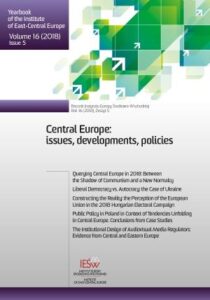Strony: 187-205
Wydanie: Lublin 2018
DOI: --
Sposób cytowania: Ludmila Golovataia, Dan Dinner, ‘Russia as immigration country: policy response to refugees and internally displaced persons’, Yearbook of the Institute of East-Central Europe, Vol. 16, No. 4, 2018, pp. 187-205.
Słowa kluczowe: forced migrants, internally displaced persons, process of socialization, refugees
Abstrakt:
The problem of people’s forced displacement refers to the most acute. People displaced by conflict, persecution or other human rights violations are the most vulnerable groups in the world. The question of how to regulate migration in such a way as to enhance its positive effects, reducing the negative ones is one of the most important in countries. Russia, like other industrialized countries, attracts migrant. However, there are significant differences between European countries and Russia. The aim of the paper is to investigate the problem of refugees and internally displaced persons in the Russian Federation in international legal, political and social aspects and possible ways for its solution. The article reflects general condition of refugees and internally displaced persons, taking into account the specifics of the political socialization process in Russia.
Bibliografia:
Andrejso S. and M. Kazankova, Legal problems of refugees in the context of forced migration processes, St. Petersburg: Med. press, 2005.
Chernysh, M. F. (ed.), Socio-Economic Factors of Inter-Ethnic Tensions in the Regions of the Russian Federation, Moscow: The Institute of Sociology of the Russian Academy of Sciences, 2015.
Convention Relating to the Status of Refugees, Population of Russia 1998: The sixth annual demographic report, 1998, https://en.wikipedia.org/wiki/Convention_Relating_to_the_Status_of_Refugees.
Council for Development of Civic Society Under the President of the Russian Federation, The Consolidated Report on Measures for Provision of Help to Persons Who Were Forced to Leave the Territory of Ukraine and Placed in the Territory of the Russian Federation, 31 October 2014, http://presidentsovet.ru/documents/read/282/.Federal Law No. 4528-I of 19 February 1993 “On Refugees” (as amended and supplemented), http://base.garant.ru/10105682 [2018-09-05].
Federal State Statistics Service, http://www.gks.ru/free_doc/new_site/inspection/vpn/vpn_popul.htm.
Information on the situation regarding citizens of Ukraine and stateless persons who left the country in an emergency and mass order, data of the Federal Migration Service of the Russian Federation of 8 April 2015, http://www.fms.gov.ru/ about / statistics / info_o_situatsii_v_otnoshenii_grazhdan_ukrainy. Information portal of the Federal Migration Service, https://ufms-russia.ru/ [2018-07-15].
Law of the Russian Federation of 19 February 1993 No. 4530-I “On Forced Migrants” (as amended and supplemented), http://base.garant.ru/10105693 [2018-09-05].
Mamontova, E., Features of contemporary migration situation in Russia, 2013, http://vernadsky.tstu.ru/pdf/2013/08/15.pdf.
Mamontova, E., ‘The problem of forced migration in Russia at the present stage’, Historical, Philosophical, Political and Legal Sciences, Culturology and Art History. Theory and Practice, no. 8(3), Таmbov: Gramota, 2015, ISSN 1997-292X, http://www.gramota.net/materials/3/2015/8-3/34.html.
Olenitskaya, E. S., ‘From Ukraine in the Territory of Russia: Problems and Experience of Crisis Phenomena Management in Intercultural Communication’, in: Russia in the Period of Transformation: Crisis Communication and Anti-Crisis Management, Yaroslavl: Academy MUB&NT, 2014.
On Amending the State Program to Promote Voluntary Resettlement in Russia of Compatriots Living Abroad, approved by Presidential Decree No. 637 of 22 June 2006, Presidential Decree No. 531 of 25 July 2014, http://graph.document.kremlin.ru/page.aspx?3646159/ [2018-07-18].
Plaksina, I. V., Constitutional and legal regulation of migration processes, Moskva 2001.

PDF: Pobierz